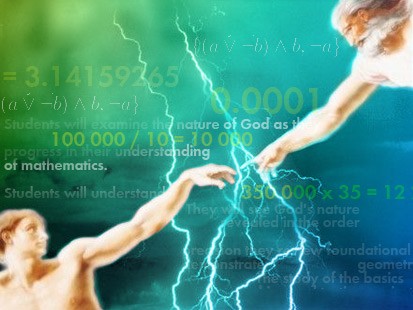
From the Empty Set to the Boundless Universe of All Sets -- Exploring the Full Range of Mathematics and Seeing its Source in Your Self
Intermediate Algebra: Using Variables to Manage the Total Possibility of Numbers and Solve Practical Problems
Its New Age calculus sequence is described thus:
Calculus 1: Derivatives as the Mathematics of Transcending, Used to Handle Changing Quantities
Calculus 2: Integrals as the Mathematics of Unification, Used to Handle Wholeness
Calculus 3: Unified Management of Change in All Possible Directions
Calculus 4: Locating Silence within Dynamism
Evolution, a Counterargument to the Divine Nature of Mathematics
Of course, there are more sophisticated ideas that are vaguely similar, and there have been first-rate scientists who have taken mathematics to be some sort of divine manifestation. One of the most well-known such arguments is due to physicist Eugene Wigner. In his famous 1960 paper, "The Unreasonable Effectiveness of Mathematics in the Natural Sciences," he maintained that ability of mathematics to describe and predict the physical world is no accident, but rather is evidence of a deep and mysterious harmony.
But is the usefulness of mathematics really so mysterious? There is a quite compelling alternative explanation why mathematics is so useful. We count, we measure, we employ basic logic, and these activities are stimulated by ubiquitous aspects of the physical world. The size of a collection (of stones, grapes, animals), for example, is associated with the size of a number and keeping track of it leads to counting. Putting collections together is associated with adding numbers, and so on.
Another metaphor associates the familiar realm of measuring sticks (small branches, say, or pieces of string) with the more abstract one of geometry, The length of a stick is associated with the size of a number (once some segment is associated with the number one), and relations between the numbers associated with a triangle, say, are noted. (Scores of such metaphors underlying more advanced mathematical disciplines have been developed by linguist George Lakoff and psychologist Rafael Nunez in their book, "Where Mathematics Comes From.")
Once part of human practice, these various notions are abstracted, idealized and formalized to create basic mathematics, and the deductive nature of mathematics then makes this formalization useful in realms to which it is only indirectly related.
The universe acts on us, we adapt to it, and the notions that we develop as a result, including the mathematical ones, are in a sense taught us by the universe. That great bugbear of creationists, evolution has selected those of our ancestors (both human and not) whose behavior and thought are consistent with the workings of the universe. The usefulness of mathematics is thus not so unreasonable.
There are, of course, many other views of mathematics (Platonism, formalism, et cetera), but whatever one's philosophy of the subject, the curricula cited above and others like them are a bit absurd, even funny. In private schools they're none of our business. This is not so if aspects of these "creation math" curricula slip into the public schools, a prospect no doubt devoutly wished for by some.
John Allen Paulos, a professor of mathematics at Temple University, is the author of the bestsellers "Innumeracy" and "A Mathematician Reads the Newspaper," as well as of the forthcoming (in December) "Irreligion." His "Who's Counting?" column on ABCNews.com appears the first weekend of every month.

No comments:
Post a Comment